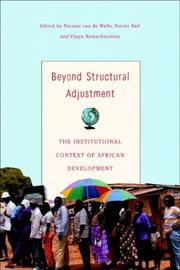| Listing 1 - 10 of 11 | << page >> |
Sort by
|

ISBN: 0198286473 9780198286479 Year: 1990 Publisher: Oxford: Clarendon,
Abstract | Keywords | Export | Availability | Bookmark
 Loading...
Loading...Choose an application
- Reference Manager
- EndNote
- RefWorks (Direct export to RefWorks)
Book
ISBN: 1933286288 9781933286280 Year: 2009 Publisher: Washington, D.C. : Center for Global Development,
Abstract | Keywords | Export | Availability | Bookmark
 Loading...
Loading...Choose an application
- Reference Manager
- EndNote
- RefWorks (Direct export to RefWorks)
Book
Year: 2013 Publisher: Washington, D.C., The World Bank,
Abstract | Keywords | Export | Availability | Bookmark
 Loading...
Loading...Choose an application
- Reference Manager
- EndNote
- RefWorks (Direct export to RefWorks)
Many countries in Africa suffer high rates of underemployment or low rates of productive employment; many also anticipate large numbers of people to enter the workforce in the near future. This paper asks the question: Are African firms creating fewer jobs than those located elsewhere? And, if so, why? One reason may be that weak business environments slow the growth of firms and distort the allocation of resources away from better-performing firms, hence reducing their potential for job creation. The paper uses data from 41,000 firms across 119 countries to examine the drivers of firm growth, with a special focus on African firms. African firms, at any age, tend to be 20-24 percent smaller than firms in other regions of the world. The poor business environment, driven by limited access to finance, and the lack of availability of electricity, land, and unskilled labor have some value in explaining this difference. Foreign ownership, the export status of the firm, and the size of the market are also significant determinants of firm size. However, even after controlling for the business environment and for characteristics of firms and markets, about 60 percent of the size gap between African and non-African firms remains unexplained.
Business Environments --- E-Business --- Environment --- Environmental Economics & Policies --- Finance and Financial Sector Development --- Foreign Ownership --- Industry --- Job Creation --- Labor Policies --- Private Sector Development --- Resource Allocation --- Small Scale Enterprise --- Social Protections and Labor --- Underemployment
Book
ISBN: 9524552884 Year: 2001 Publisher: Helsinki United Nations University. World Institute for Development Economics Research
Abstract | Keywords | Export | Availability | Bookmark
 Loading...
Loading...Choose an application
- Reference Manager
- EndNote
- RefWorks (Direct export to RefWorks)

ISBN: 1403963177 1403963169 Year: 2003 Publisher: New York (N.Y.) Palgrave Macmillan
Abstract | Keywords | Export | Availability | Bookmark
 Loading...
Loading...Choose an application
- Reference Manager
- EndNote
- RefWorks (Direct export to RefWorks)
Structural adjustment (Economic policy) --- #SBIB:043.IOS --- #SBIB:328H41 --- #SBIB:35H6050 --- Instellingen en beleid: Afrika: comparatief / diverse landen --- Bestuur en beleid: nationale en regionale studies: Afrika --- #A0507PSA --- Africa, Sub-Saharan --- Economic policy. --- Politics and government --- Government --- Economic policy and planning (general) --- Developing countries: economic development problems --- Africa

ISBN: 0898713137 Year: 1993 Publisher: Society for Industrial and Applied Mathematics
Abstract | Keywords | Export | Availability | Bookmark
 Loading...
Loading...Choose an application
- Reference Manager
- EndNote
- RefWorks (Direct export to RefWorks)

ISBN: 9781403963178 Year: 2004 Publisher: New York (N.Y.) Palgrave Macmillan
Abstract | Keywords | Export | Availability | Bookmark
 Loading...
Loading...Choose an application
- Reference Manager
- EndNote
- RefWorks (Direct export to RefWorks)
Book
Year: 2008 Publisher: Washington, D.C., The World Bank,
Abstract | Keywords | Export | Availability | Bookmark
 Loading...
Loading...Choose an application
- Reference Manager
- EndNote
- RefWorks (Direct export to RefWorks)
Can perceptions data help us understand investment climate constraints facing the private sector? Or do firms simply complain about everything? In this paper, the authors provide a picture of how firms' views on constraints differ across countries in Sub-Saharan Africa. Using the World Bank's Enterprise Surveys database, they find that reported constraints reflect country characteristics and vary systematically by level of income-the most elemental constraints to doing business (power, access to finance, ability to plan ahead) appear to be most binding at low levels of income. As countries develop and these elemental constraints are relaxed, governance-related constraints become more problematic. As countries move further up the income scale and the state becomes more capable, labor regulation is perceived to be more of a problem-business is just one among several important constituencies. The authors also consider whether firm-level characteristics-such as size, ownership, exporter status, and firms' own experience-affect firms' views on the severity of constraints. They find that, net of country and sector fixed effects and firm characteristics, firms' views do reflect their experience as evidenced by responses to other questions in surveys. The results suggest that there are both country-level and firm-level variations in the investment climate. Turning to the concept of "binding constraints," the Enterprise Surveys do not generally suggest one single binding constraint facing firms in difficult business climates. However, there do appear to be groups of constraints that matter more at different income levels, with a few elemental constraints being especially important at low levels and a few regulatory constraints at high levels, but a difficult range of governance-related constraints at intermediate levels. Adjusting to a constraint does not mean that firms then do not recognize it-for example, generator-owning firms are not distinguishable from other firms when ranking electricity as a constraint. Overall, firms do appear to discriminate between constraints in a reasonable way. Their views can provide a useful first step in the business-government consultative process and help in prioritizing more specific behavioral analysis and policy reforms.
Access to Credit --- Access to Finance --- Corruption --- Discrimination --- Earnings --- Economic Cooperation --- Emerging Markets --- Entrepreneurs --- Environment --- Environmental Economics and Policies --- Finance and Financial Sector Development --- Governance --- Governance Indicators --- International Bank --- Microfinance --- Multinationals --- Private Sector Development --- Sales Growth
Book
Year: 2008 Publisher: Washington, D.C., The World Bank,
Abstract | Keywords | Export | Availability | Bookmark
 Loading...
Loading...Choose an application
- Reference Manager
- EndNote
- RefWorks (Direct export to RefWorks)
Can perceptions data help us understand investment climate constraints facing the private sector? Or do firms simply complain about everything? In this paper, the authors provide a picture of how firms' views on constraints differ across countries in Sub-Saharan Africa. Using the World Bank's Enterprise Surveys database, they find that reported constraints reflect country characteristics and vary systematically by level of income-the most elemental constraints to doing business (power, access to finance, ability to plan ahead) appear to be most binding at low levels of income. As countries develop and these elemental constraints are relaxed, governance-related constraints become more problematic. As countries move further up the income scale and the state becomes more capable, labor regulation is perceived to be more of a problem-business is just one among several important constituencies. The authors also consider whether firm-level characteristics-such as size, ownership, exporter status, and firms' own experience-affect firms' views on the severity of constraints. They find that, net of country and sector fixed effects and firm characteristics, firms' views do reflect their experience as evidenced by responses to other questions in surveys. The results suggest that there are both country-level and firm-level variations in the investment climate. Turning to the concept of "binding constraints," the Enterprise Surveys do not generally suggest one single binding constraint facing firms in difficult business climates. However, there do appear to be groups of constraints that matter more at different income levels, with a few elemental constraints being especially important at low levels and a few regulatory constraints at high levels, but a difficult range of governance-related constraints at intermediate levels. Adjusting to a constraint does not mean that firms then do not recognize it-for example, generator-owning firms are not distinguishable from other firms when ranking electricity as a constraint. Overall, firms do appear to discriminate between constraints in a reasonable way. Their views can provide a useful first step in the business-government consultative process and help in prioritizing more specific behavioral analysis and policy reforms.
Access to Credit --- Access to Finance --- Corruption --- Discrimination --- Earnings --- Economic Cooperation --- Emerging Markets --- Entrepreneurs --- Environment --- Environmental Economics and Policies --- Finance and Financial Sector Development --- Governance --- Governance Indicators --- International Bank --- Microfinance --- Multinationals --- Private Sector Development --- Sales Growth
Book
Year: 1993 Publisher: [Place of publication not identified] Society for Industrial and Applied Mathematics
Abstract | Keywords | Export | Availability | Bookmark
 Loading...
Loading...Choose an application
- Reference Manager
- EndNote
- RefWorks (Direct export to RefWorks)
| Listing 1 - 10 of 11 | << page >> |
Sort by
|

 Search
Search Feedback
Feedback About UniCat
About UniCat  Help
Help News
News